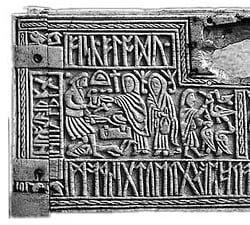Volund
Weyland (also spelled Wayland, Weland and Watlende) is a mythical smith-god of the Anglo-Saxon religion brought with the Saxon settlers of Britain. He is synonymous with the Norse/Germanic Völundr of the Völundarkviða, a poem in the Poetic Edda.
Mythic Accounts
Weyland had two brothers, Egil and Slagfiðr (Slagfid/Slagfinn). In one version of the myth, the three brothers lived with three Valkyries: Ölrún, Alvitr and Svanhvít. After nine years, the Valkyries left their lovers. Egil and Slagfiðr followed, never to return. In another version, Weyland married the swan maiden Hervör, and they had a son, Heime; Hervör later left him. In both versions, his love left him with a ring; in the former myth, he forged seven hundred duplicates of this ring.
At a later point in time, he was captured in his sleep by King Nidud in Nerike who ordered him hamstrung and imprisoned on the island of Sævarstöð. There he was forced to forge items for the king. Weyland's wife's ring was given to the king's daughter, Bodvild. Nidud wore Weyland's sword.
For revenge, Weyland killed the king's sons when they visited him in secret, fashioned goblets from their skulls, jewels from their eyes, and a brooch from their teeth. He sent the goblets to the king, the jewels to the queen and the brooch to the king's daughter. When Bodvild took her ring to him to be mended, he took the ring and seduced her, fathering a son and escaping on wings he made.
He is particularly associated with Wayland's Smithy, a burial mound in Oxfordshire. This was named by the Saxons, but the megalithic mound significantly predates them. It is from this association that the superstition came about that a horse left there overnight with a small silver coin (a groat) would be shod by morning.
External links
Credits
New World Encyclopedia writers and editors rewrote and completed the Wikipedia article in accordance with New World Encyclopedia standards. This article abides by terms of the Creative Commons CC-by-sa 3.0 License (CC-by-sa), which may be used and disseminated with proper attribution. Credit is due under the terms of this license that can reference both the New World Encyclopedia contributors and the selfless volunteer contributors of the Wikimedia Foundation. To cite this article click here for a list of acceptable citing formats.The history of earlier contributions by wikipedians is accessible to researchers here:
The history of this article since it was imported to New World Encyclopedia:
Note: Some restrictions may apply to use of individual images which are separately licensed.
